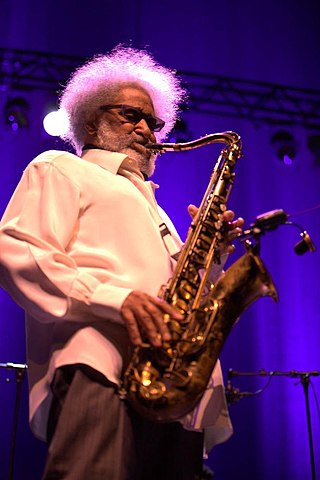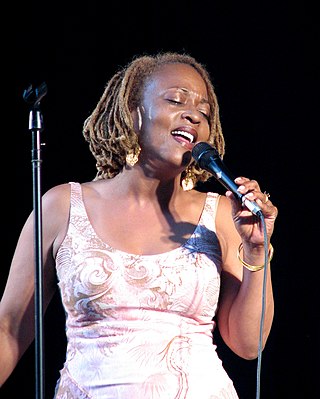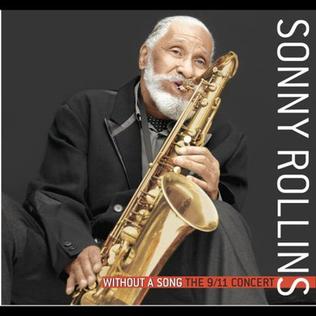Jazz is a music genre that originated in the African-American communities of New Orleans, Louisiana, in the late 19th and early 20th centuries, with its roots in blues, ragtime, European harmony and African rhythmic rituals. Since the 1920s Jazz Age, it has been recognized as a major form of musical expression in traditional and popular music. Jazz is characterized by swing and blue notes, complex chords, call and response vocals, polyrhythms and improvisation.

Maxwell Lemuel Roach was an American jazz drummer and composer. A pioneer of bebop, he worked in many other styles of music, and is generally considered one of the most important drummers in history. He worked with many famous jazz musicians, including Clifford Brown, Coleman Hawkins, Dizzy Gillespie, Charlie Parker, Miles Davis, Duke Ellington, Thelonious Monk, Abbey Lincoln, Dinah Washington, Charles Mingus, Billy Eckstine, Stan Getz, Sonny Rollins, Eric Dolphy, and Booker Little. He also played with his daughter Maxine Roach, a Grammy nominated violist. He was inducted into the DownBeat Hall of Fame in 1980 and the Modern Drummer Hall of Fame in 1992.
Given the vastness of the African continent, its music is diverse, with regions and nations having many distinct musical traditions. African music includes the genres makwaya, highlife, mbube, township music, jùjú, fuji, jaiva, afrobeat, afrofusion, mbalax, Congolese rumba, soukous, ndombolo, makossa, kizomba, taarab and others. African music also uses a large variety of instruments from all across the continent. The music and dance of the African diaspora, formed to varying degrees on African musical traditions, include American music like Dixieland jazz, blues, jazz, and many Caribbean genres, such as calypso and soca. Latin American music genres such as cumbia, salsa music, son cubano, rumba, conga, bomba, samba and zouk were founded on the music of enslaved Africans, and have in turn influenced African popular music.
Highlife is a Ghanaian music genre that originated along the coastal cities of present-day Ghana in the 19th century, during its history as a colony of the British and through its trade routes in coastal areas. It describes multiple local fusions of African metre and western jazz melodies. It uses the melodic and main rhythmic structures of traditional African music, but is typically played with Western instruments. Highlife is characterized by jazzy horns and guitars which lead the band and its use of the two-finger plucking guitar style that is typical of African music. Recently it has acquired an uptempo, synth-driven sound.
There are many styles of traditional and modern music of Ghana, due to Ghana's worldwide geographic position on the African continent.

Walter Theodore "Sonny" Rollins is an American retired jazz tenor saxophonist who is widely recognized as one of the most important and influential jazz musicians. In a seven-decade career, he has recorded over sixty albums as a leader. A number of his compositions, including "St. Thomas", "Oleo", "Doxy", and "Airegin", have become jazz standards. Rollins has been called "the greatest living improviser". Due to health problems, Rollins has not performed publicly since 2012 and announced his retirement in 2014.

Alvin Ailey Jr. was an American dancer, director, choreographer, and activist who founded the Alvin Ailey American Dance Theater (AAADT). He created AAADT and its affiliated Alvin Ailey American Dance Center as havens for nurturing Black artists and expressing the universality of the African-American experience through dance.

Cassandra Wilson is an American jazz singer, songwriter, and producer from Jackson, Mississippi. She is one of the most successful female jazz singers and has been described by critic Gary Giddins as "a singer blessed with an unmistakable timbre and attack [who has] expanded the playing field" by incorporating blues, country, and folk music into her work. She has won numerous awards, including two Grammys, and was named "America's Best Singer" by Time magazine in 2001.
Guy Warren of Ghana, also known as Kofi Ghanaba, was a Ghanaian musician, most notable as the inventor of Afro-jazz — "the reuniting of African-American jazz with its African roots" — and as a member of The Tempos, alongside E. T. Mensah. He also inspired musicians such as Fela Kuti. Warren's virtuosity on the African drums earned him the appellation "The Divine Drummer". At different stages of his life, he additionally worked as a journalist, DJ and broadcaster.

Regina Carter is an American jazz violinist. She is the cousin of jazz saxophonist James Carter.

Russell Lamar Malone was an American jazz guitarist. He began working with Jimmy Smith in 1988 and went on to work with Harry Connick Jr. and Diana Krall throughout the 1990s.

Sean Jones is an American trumpeter and composer featured on the 2007 Grammy Award-winning album Turned to Blue by Nancy Wilson. As a bandleader, Jones has released eight albums under the Mack Avenue Records label. He performs with his own groups both nationally and internationally. Jones often plays at music venues and jazz festivals such as the Monterey Jazz Festival, Detroit International Jazz Festival, the Vail Jazz Festival and Montreal International Jazz Festival.

A jazz club is a venue where the primary entertainment is the performance of live jazz music, although some jazz clubs primarily focus on the study and/or promotion of jazz-music. Jazz clubs are usually a type of nightclub or bar, which is licensed to sell alcoholic beverages. Jazz clubs were in large rooms in the eras of Orchestral jazz and big band jazz, when bands were large and often augmented by a string section. Large rooms were also more common in the Swing era, because at that time, jazz was popular as a dance music, so the dancers needed space to move. With the transition to 1940s-era styles like Bebop and later styles such as soul jazz, small combos of musicians such as quartets and trios were mostly used, and the music became more of a music to listen to, rather than a form of dance music. As a result, smaller clubs with small stages became practical.
DanceAfrica is a heritage and community celebration equable on the manifold dance forms of the African Diaspora held annually in New York City, Washington, DC, and Chicago. Included are indoor and outdoor performance including live music, a film series, master classes, education programs, and an outdoor bazaar. Its current artistic director is Abdel R. Salaam.

Revelations is the best-known work of the modern dance choreographer Alvin Ailey. It is also the signature work of the Alvin Ailey American Dance Theater, which premiered an extended version of the work in 1960, when Ailey was 29 years old. Set to spirituals, gospel, and blues music and influenced by the choreographer's own Christian upbringing, it presents a vision of the historical African American experience from a church-inspired perspective. The three sections of the final 36-minute revised version depict the suffering of slavery, baptismal joy, and a choral church celebration.
Stephen Scott is an American jazz pianist. Scott played piano from the age of five. While attending New York’s High School of the Performing Arts he was introduced to jazz by alto saxophonist Justin Robinson, in particular the music of Wynton Kelly and Red Garland. Later, he took private lessons at the Juilliard School of Music.

Without a Song: The 9/11 Concert is a 2005 live album by jazz saxophonist Sonny Rollins, recorded in Boston on September 15, 2001.

The term African fiddle may be applied to any of several African bowed string instruments.
Yacub Addy was a Ghanaian traditional drummer, composer, choreographer and educator who collaborated with many musicians in various genres, including Wynton Marsalis. He has been referred to as "the leading ambassador of Ghanaian music and culture".
Ismay Andrews was one of the earliest major teachers of African dance in the United States. Her career started in 1929 as a stage actress, and she taught dance in community centers in New York City from 1934 to 1959.










